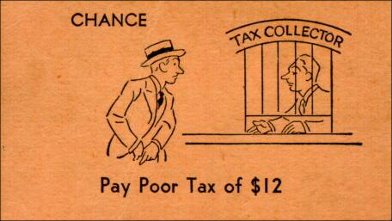Adan Salazar
Infowars.com
April 23, 2013
If you were to take the benefits pointed out by the White House about the “Marketplace Fairness Act” at face value, you would think you had a bill that was actually going to help small business owners.
 The bill cruised through a Senate procedural vote yesterday 74-20 earning 26 votes from Republicans, and amendments are being worked on with the decisive vote to be held later this week. The Republican-controlled House will have the final say on the bill’s passage.
The bill cruised through a Senate procedural vote yesterday 74-20 earning 26 votes from Republicans, and amendments are being worked on with the decisive vote to be held later this week. The Republican-controlled House will have the final say on the bill’s passage.
For all the White House’s talk of “leveling the playing field” however, the bill should be viewed as a major red flag that threatens small businesses making more than $1 million, and as an affront to state’s rights. It may also have unintended consequences that could potentially tax workers’ 401(k) contributions.
Here’s why:
It is actually a threat to small business
The bill sets the threshold for small businesses required to pay taxes at only $1 million. While that may sound like big money to the average person, it’s relatively small beans to an online retailer.
That means a small business that pushed hard to reach the $1 million mark will proceed to get taxed on that revenue. This is one of the reasons why online merchants like Ebay are protesting the bill.
“This legislation treats you and big multi-billion dollar online retailers — such as Amazon — exactly the same,” eBay CEO John Donahoe said in an email sent out to merchants. “Those fighting for this change refuse to acknowledge that the burden on businesses like yours is far greater than for a big national retailer.”
According to Reuters, “Amazon generates more than $10 million in sales every 90 minutes, giving the world’s largest Internet retailer more resources than a typical small merchant to collect sales tax in all states, Donahoe argued.”
Ebay is lobbying to get the $1 million mark lifted to $10 million.
Sen. Max Baucus, D-Mont. agrees that “This legislation doesn’t help businesses expand and grow and hire more employees… Instead, it forces small businesses to hire expensive lawyers and accountants to deal with the burdensome paperwork and added complexity of tax rules and filings across multiple states.”
Such a mandate, says Sen. Rand Paul, would suffocate small businesses and job creators already being strangled by taxes like the Obamacare measure. “At a time when businesses are already being strangled by job-destroying regulations, such as those imposed by Obamacare, the Internet Tax Mandate would add even more costs to our nation’s small businesses and job creators. The requirement to calculate sales-tax rates, much less collect those taxes, for each customer becomes even more burdensome when considering the various state, city and county sales taxes that will be imposed across the United States,” Sen. Paul told the Washington Times.
An affront to state’s rights
The Marketplace Fairness Act would also empower states to require online retailers to collect state and local sales taxes for online purchases. That means even states that do not collect a state sales tax, like Delaware, Montana, Oregon, New Hampshire and Alaska, could be forced to incur or collect online sales taxes.
“It is going to make online businesses the tax collectors for the nation,” said Sen. Kelly Ayotte.“It really tramples on a decision New Hampshire has made not to have a sales tax.”
“Small online sellers will therefore have to comply with tax laws created by distant governments in which they have no representation, and in places where they consume no local services,” writes The Wall Street Journal.
States that do implement the taxes could potentially see profits ranging in the billions filling their coffers.
As the law is written now, states are only allowed to collect taxes from online retailers who have physical buildings in that state. Current taxes on online purchases work on a good-faith basis, that is, people are supposed to declare their online purchases on tax forms, but hardly anyone does. This bill would in effect close that loophole, or at least leave it up to the states to close.
A Potential Tax on Retirement Funds?
As the tax would apply to online transactions, some are worried the legislation could snowball into an outright online financial transaction tax, hurting retired Americans who save and invest in 401(k)s.
The American Society of Pension Professionals & Actuaries expressed that such a tax could apply to millions of workers.
“Over 70 million workers could be affected since most transactions within these plans now take place over the Internet,” Brian Graff, executive director and CEO of the American Society of Pension Professionals & Actuaries, stated.
Several senators, including Ron Wyden (D-Ore.), Marco Rubio (R-Fla), Mike Lee (R-Utah) and Ted Cruz (R-Texas). have written Senate Majority Leader Harry Reid arguing the bill is not ready for a Senate floor debate. “At the very minimum, we believe these concerns warrant a thorough vetting of the bill through regular order,” they wrote.
And while the Boston bombings have held the nation’s attention for the past week, another draconian bill slithered its way closer to passage. The CISPA bill passed the House last week and stands ready to put your personal information in the hands of military organizations like the National Security Agency if it receives the proper Senate vote.
“Under the legislation,” the AP reports, “businesses and the federal government would be able to share technical data without worrying about anti-trust or classification laws. The bill also would grant businesses legal immunity if hacked so long as they acted in good faith to protect their networks.”
The Emergency Election Sale is now live! Get 30% to 60% off our most popular products today!


